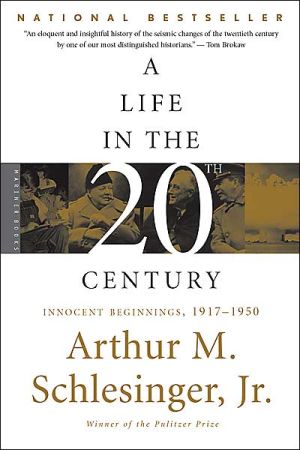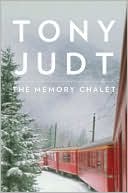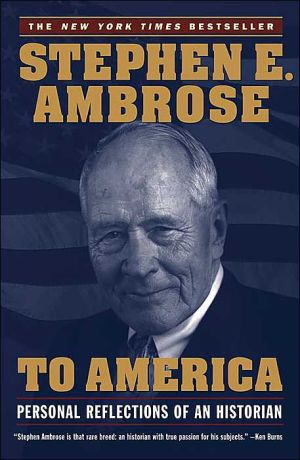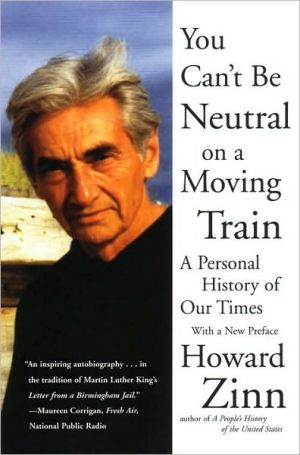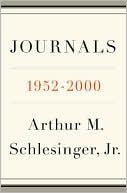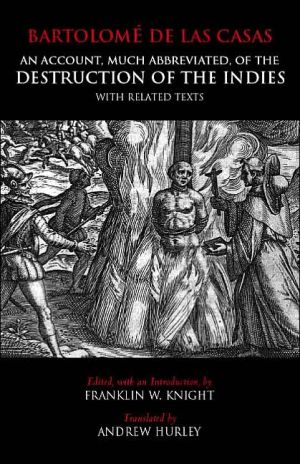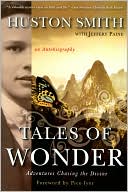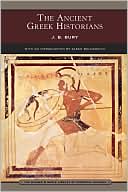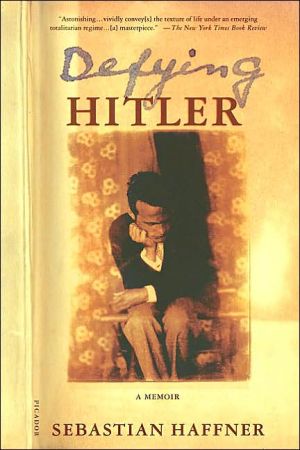A Life in the Twentieth Century: Innocent Beginnings, 1917-1950
From America's most celebrated living historian comes this "sprightly, straightforward account of the first third of an active and charmed life" (New York Times). Arthur Schlesinger, Jr. turns a studied eye on a personal past and reconstructs the history that has made him such an iconic figure for generations of readers. A LIFE IN THE TWENTIETH CENTURY offers rare and revealing access to both the private world of a great American writer and the fine-grained texture of the American century.\...
Search in google:
From America's most celebrated living historian comes this "sprightly, straightforward account of the first third of an active and charmed life" (New York Times). Arthur Schlesinger, Jr. turns a studied eye on a personal past and reconstructs the history that has made him such an iconic figure for generations of readers. A LIFE IN THE TWENTIETH CENTURY offers rare and revealing access to both the private world of a great American writer and the fine-grained texture of the American century. Ranging from a fondly remembered childhood in the Midwest to a fascinating, storied academic and political life, this volume is an important addition to Schlesinger's body of work, "every bit as well written as anything Schlesinger has done" (Providence Sunday Journal) and "sure to be used by students of the times for years to come" (Boston Globe). "With style and humor and a master historian's deft blending of personal detail with epic events" (Wall Street Journal), Schlesinger evokes the struggles, the questions, the paradoxes, and the triumphs that shaped our era as only he can do. Publishers Weekly Schlesinger's memoir covers the first 33 years of a life spent as a public thinker and historian. Born into a world of intellectual privilege, Schlesinger was exposed from his earliest years to literature and, through his father's work as a historian, to scholarship. The author recounts how his education at an elite prep school, a year-long trip around the world, and then at Harvard and Cambridge. Drawn to American history, Schlesinger wrote on Orestes Brownson and Andrew Jackson, and spent his war years as a political analyst for the OSS. Scattered through the chronology are ruminations on fads in historical interpretation, movies as the American art form, the pleasures of the martini and many other side points of interest and charm. Schlesinger recounts his interactions with an impressive array of personalities eminent in politics, academia and society; the scores of character sketches he furnishes are, in nearly all instances, sympathetic and affectionate. For Schlesinger, his personal experience, like American history, has been marked by, as Joyce said in Finnegan's Wake, a "commodius vicus of recirculation." He explains how people he met early in his career turn up again in a later era, just as a school of historical interpretation will fall out of favor only to be rediscovered by the next generation of historians. Schlesinger's personal and intellectual life validates his theory of circularity, except in one key respect: the author started as an anticommunist, liberal New Dealer, and he has adhered to these convictions ever since. The engaging and sophisticated volume explains how these principles were acquired and why they continue to command Schlesinger's assent. (Nov.) Copyright 2000 Cahners Business Information.
\ \ \ \ Excerpt\ \ \ Around sunset we approached Trinidad, a bleak mining town. That night Roosevelt was to give a fireside chat on national defense. We parked by the side of the country road in the hope of minimizing static on the car radio. A crimson glow was fading on the Spanish Peaks. Dusk fell.\ All about seemed dark and silent and limitless. Then the well- remembered voice, at once melodious and urgent, came on the air. Some Mexicans appeared out of a little adobe hut, bowing, smiling, apologetic so Benny described the scene in The Easy Chair, the monthly column he contributed to Harper's and asked if they might listen too. The grave presidential tone seized us all. No one stirred, except to light cigarettes, smoking the car into a gray haze. When it was finished, Benny wrote, one of our guests said, 'I guess maybe America declare war pretty soon now.' We waved goodbye and drove on to Trinidad. I guess maybe.\ \
ContentsForeword xiii1 Backdrop 1 Part I: The Twenties 2 East from Iowa 23 3 Midwesterners in Cambridge 41 4 Life of a Reader 62 Part II: The Thirties 5 Prep School 81 6 Round the World 93 7 Harvard College: What I Did 108 8 Harvard College: What I Enjoyed 132 9 Harvard College: What I Learned 157 10 The Twilight Year 187 Part III: The Forties 11 A Nation Divided 221 12 On the Brink 241 13 Washington at War 26214 Blowup at OWI 277 15 Oh So Secret 295 16 London 1944 314 17 War’s End 330 18 The Ages of Jackson 354 19 Free Lance 375 20 CPUSA vs. ADA 394 21 Alarums and Excursions 418 22 Back to Harvard 439 23 1948 455 24 Deals Fair and Unfair 483 25 The Vital Center 504 Index 525
\ From Barnes & NobleArthur Schlesinger Jr., one of America's most respected historians, shares the first third of his own personal history. By presenting his own fascinating life in a memoir the New York Times called "sprightly...straightforward," he continues to masterfully educate the reader about the world at large.\ \ \ \ \ Publishers Weekly - Publisher's Weekly\ Schlesinger's memoir covers the first 33 years of a life spent as a public thinker and historian. Born into a world of intellectual privilege, Schlesinger was exposed from his earliest years to literature and, through his father's work as a historian, to scholarship. The author recounts how his education at an elite prep school, a year-long trip around the world, and then at Harvard and Cambridge. Drawn to American history, Schlesinger wrote on Orestes Brownson and Andrew Jackson, and spent his war years as a political analyst for the OSS. Scattered through the chronology are ruminations on fads in historical interpretation, movies as the American art form, the pleasures of the martini and many other side points of interest and charm. Schlesinger recounts his interactions with an impressive array of personalities eminent in politics, academia and society; the scores of character sketches he furnishes are, in nearly all instances, sympathetic and affectionate. For Schlesinger, his personal experience, like American history, has been marked by, as Joyce said in Finnegan's Wake, a "commodius vicus of recirculation." He explains how people he met early in his career turn up again in a later era, just as a school of historical interpretation will fall out of favor only to be rediscovered by the next generation of historians. Schlesinger's personal and intellectual life validates his theory of circularity, except in one key respect: the author started as an anticommunist, liberal New Dealer, and he has adhered to these convictions ever since. The engaging and sophisticated volume explains how these principles were acquired and why they continue to command Schlesinger's assent. (Nov.) Copyright 2000 Cahners Business Information.\ \ \ From The Critics"For more than fifty years, Arthur Schlesinger has been at the vital center of our public life. He has not only chronicled American history, he has helped to define it -- as the fighting intellectual of Americans for Democratic Action, adviser to Adlai Stevenson, special assistant to President Kennedy. . .What a remarkable life he has lived; what wonderful books he has written." --President Bill Clinton, on the occasion of awarding the 1998 National Humanities Medal\ \ \ \ \ Library JournalThe first of two volumes, this memoir by one of the best-known liberal historians of the 20th century traces Schlesinger's life from his very early years in the Midwest through the formative influences of his well-educated parents and his privileged education and travel. As one would expect, the early chapters contain quite a few vague reminiscences and third-party accounts, plus a good deal of pure sentimentality. But they serve the purpose of beginning to show a human side behind the intellectual surface, something the author accomplishes throughout the memoir. The work hits its stride as Schlesinger describes the five years following World War II, the emergence of the Cold War, and his rise as an active public intellectual; it is particularly strong in explaining the development of Schlesinger's liberal political persuasion. Schlesinger writes with extremely good humor, often directed at himself, but also shares his well-known opinions about world and national affairs, making the book anything but dull. An excellent addition to most libraries.--Charles K. Piehl, Minnesota State Univ., Mankato Copyright 2000 Cahners Business Information.\ \ \ \ \ Jon MeachamSchlessinger's memoir, the first of two projected volumes, captures a milieu that is fast receding into the shadows—a world in which politics and the life of the mind were not incompatible, and the American Century was fueled by big ideas, epic events and not a few martinis..."History," Schlessinger concludes, "is indeed an argument without end, That is why it is so much fun." So is this book.\ —Newsweek\ \ \ \ \ New YorkerWith a fine historian's sense of the past, Schlesinger imbues every aspect of the first volume of his memoirs with vitality, telling readers, most of them, inevitably, younger than he, just what they need to know —the everyday details (such as what people wore and what things cost) or, in the case of the intellectual celebrities who appear, why their work matters....and he shrewdly point out the parallels between an era's arguments over historical interpretation and its political issues, as in his discussion of recent disputes over when the Allies became aware of the Holocaust.\ \ \ \ \ Richard Bernstein. . . a sprightly, straightforward account of the first third of an active and charmed life, one lived virtually from the beginning in easy intimacy with the American elite, intellectual and political, as well as with the central debates of the era.\ —New York Times Magazine\ \ \ \ \ Kirkus ReviewsAn appealing memoir by a fine historian who is mercifully free of the besetting sin of the intellectual—the need always to be right. Schlesinger's strength as a historian is his ability to unite intellectual and political history, and the strength of this autobiography is the way it unites these elements of his own life and times. The three great issues of this period were the conflict between isolationism and interventionism before WWII, the conflict with Nazism, and the more enduring battle with Communism. He maintains that no conflict in his lifetime tore apart friendships and families more than the first, but he reminds us, too, of just how tenuous our victory over totalitarianism was. By the end of 1940, only a dozen democracies were left on the planet. Since this account covers only the first 33 years of Schlesinger's life, his role in all these battles was necessarily a minor one, but he played an honorable part in all of them and avoided what he calls "the fatal error of mistaking ideology for reality." He gained increasing recognition during the period, culminating in a Pulitzer Prize for The Age of Jackson (1945), but he seldom allows himself to be unduly impressed: referring to his customary choice of neckwear, he argues that "it is impossible, or at least it requires extreme agility, to spill anything on a bow tie." Although he describes himself as a New Dealer, unreconstructed and unrepentant, he is notably even-handed and moderate in his judgments, writing of liberalism that "it often tends to be a solemn creed, or, when not solemn, sentimental, or, too often, both." A fascinating and generous account of a life tuned to the music of history.Book-of-the-MonthClub/History Book Club selection Sinclair, Andrew DYLAN THE BARD: A Life of Dylan Thomas Dunne/St. Martin's (256 pp.) Nov. 2000\ \
